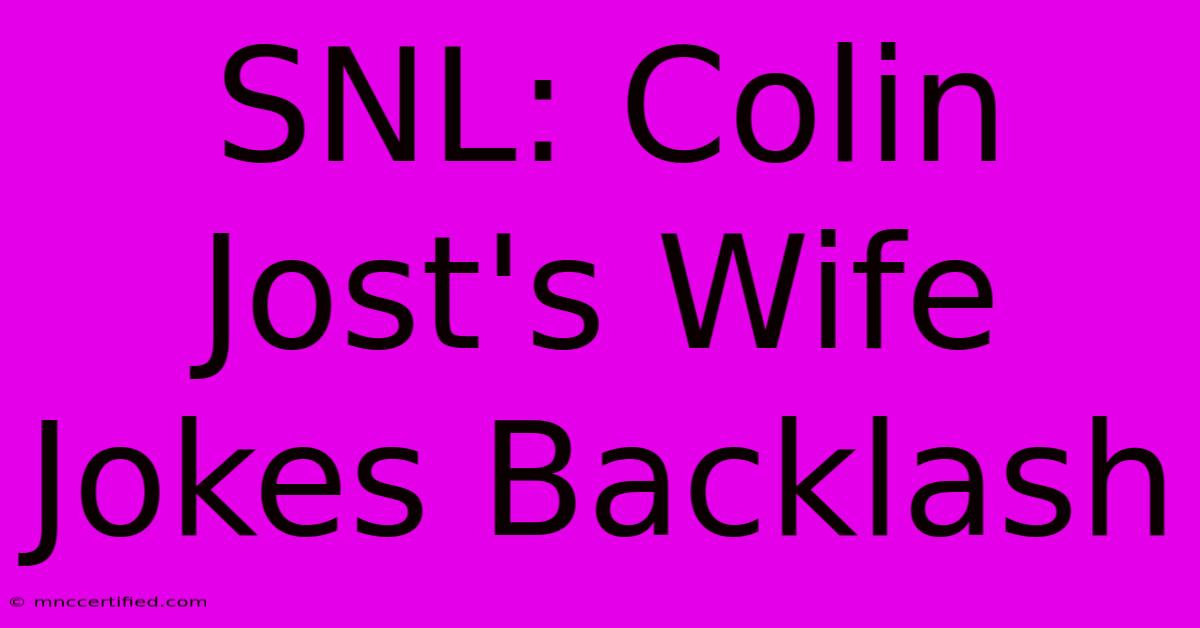SNL: Colin Jost's Wife Jokes Backlash

Table of Contents
SNL: Colin Jost's Wife Jokes Backlash – A Deeper Dive into the Controversy
Colin Jost, the beloved co-anchor of Saturday Night Live's Weekend Update, recently found himself at the center of an online controversy. His jokes targeting his wife, Scarlett Johansson, sparked a significant backlash, prompting discussions about the boundaries of humor, public figures' private lives, and the evolving landscape of online criticism. This article delves into the specifics of the backlash, explores the nuances of the situation, and examines the broader implications for comedians and public figures navigating the digital age.
The Jokes That Ignited the Backlash
The controversy stemmed from several jokes Jost delivered during his Weekend Update segments. While the exact jokes varied slightly from performance to performance, the common thread was a lighthearted, yet arguably self-deprecating, portrayal of his marriage to the renowned actress. Some jokes touched upon the perceived power imbalance in their relationship, others poked fun at their differing levels of fame, and some alluded to aspects of their personal life. While intended as humorous observations, a segment of the audience interpreted them as disrespectful, insensitive, or even misogynistic.
Why the Backlash? Analyzing the Audience Reaction
The negative reaction wasn't uniform. Many viewers found the jokes amusing, seeing them as typical of Jost's comedic style and reflective of the self-aware humor often present in his Weekend Update segments. However, a significant portion of the audience took offense, citing several reasons:
- Power Dynamics: Some argued that the jokes reinforced existing power imbalances between men and women in Hollywood, with Jost, a relatively lesser-known comedian, using his platform to potentially trivialize or undermine his globally famous wife.
- Public vs. Private: The criticism highlighted the blurring of lines between public and private life. While celebrities often invite public scrutiny, many believe there are boundaries that shouldn't be crossed, especially concerning intimate details of their relationships.
- The Nature of Humor: The very definition of humor came under debate. What one person finds funny, another might find offensive, and the subjective nature of comedy is often at the heart of such controversies.
- Online Amplification: Social media played a significant role in amplifying the backlash. Negative comments, fueled by algorithms and echo chambers, quickly gained traction, creating a powerful narrative that overshadowed more positive responses.
Navigating the Shifting Sands of Public Opinion in the Digital Age
The Colin Jost situation exemplifies the challenges faced by comedians and public figures in the current digital environment. The instantaneity and widespread reach of online platforms mean that even seemingly innocuous jokes can be instantly scrutinized, amplified, and interpreted in unexpected ways. This necessitates a careful consideration of comedic material and an awareness of the potential consequences.
The Role of Context and Intent
It's crucial to understand that context plays a significant role in determining the reception of a joke. What might be acceptable within a specific comedic framework could be perceived differently when taken out of context or viewed through a different lens. Similarly, the comedian's intent – whether to be genuinely funny, satirical, or even provocative – influences the audience's interpretation.
Moving Forward: Lessons Learned and Future Implications
The backlash surrounding Colin Jost's jokes serves as a valuable case study for comedians and public figures. It underscores the importance of:
- Self-Awareness: Being mindful of potential power dynamics and societal sensitivities when crafting comedic material.
- Contextualization: Ensuring that jokes are presented within an appropriate context and are unlikely to be misinterpreted.
- Online Engagement: Actively monitoring online conversations and responding thoughtfully to criticism, even if it's negative.
- Adaptability: Understanding that the definition of humor and acceptable comedic boundaries are constantly evolving in a rapidly changing digital landscape.
The controversy surrounding Colin Jost's jokes highlights the complexities of navigating humor in the digital age. It's a reminder that public figures, particularly those with significant platforms, must be mindful of their words and actions, and that the responsibility of creating and consuming comedy must be approached with greater sensitivity and awareness. The debate continues, but one thing is clear: the boundaries of humor are constantly shifting, and navigating this landscape requires careful consideration, self-awareness, and a willingness to engage in thoughtful dialogue.

Thank you for visiting our website wich cover about SNL: Colin Jost's Wife Jokes Backlash. We hope the information provided has been useful to you. Feel free to contact us if you have any questions or need further assistance. See you next time and dont miss to bookmark.
Featured Posts
-
Leicester Vs Wolves 0 3 Match Report
Dec 23, 2024
-
Hurts Concussion Eagles Qb Leaves Game
Dec 23, 2024
-
Colin Jost Surprises Scarlett Johansson On Snl
Dec 23, 2024
-
Key Matchups Lions Vs Bears Stats
Dec 23, 2024
-
Everton Vs Chelsea Match Stream And Result
Dec 23, 2024